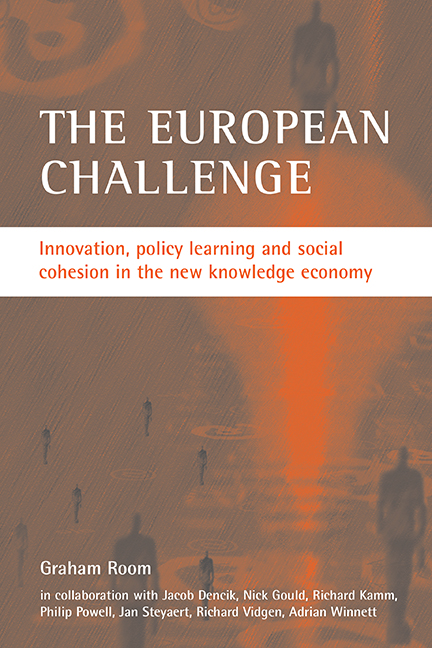Book contents
- Frontmatter
- Contents
- List of figures and tables
- Preface
- one The new knowledge-based economy
- two The EU response
- three Growth and stability
- four Dynamics and innovation
- five Enterprise and organisational change
- six Human investment and learning
- seven Social cohesion and inclusion
- eight Models and measurement
- nine Benchmarking and governance
- ten Globalisation and the knowledge economy
- Endnotes
- References
- Index
Preface
Published online by Cambridge University Press: 18 January 2022
- Frontmatter
- Contents
- List of figures and tables
- Preface
- one The new knowledge-based economy
- two The EU response
- three Growth and stability
- four Dynamics and innovation
- five Enterprise and organisational change
- six Human investment and learning
- seven Social cohesion and inclusion
- eight Models and measurement
- nine Benchmarking and governance
- ten Globalisation and the knowledge economy
- Endnotes
- References
- Index
Summary
This book arises from work undertaken at the University of Bath during 2001-04, as part of the NESIS (New Economy Statistical Information System) project. Our final report, submitted in August 2004, offered a critical appraisal of the various indicator sets which were available to benchmark the new economy. This book builds on that work, setting this appraisal in the larger context of debates about policy benchmarking, governance and globalisation. I am grateful to my co-authors for allowing me to undertake this task, even if the result is one which does not do justice to the full range of work which they undertook within the NESIS project.
NESIS was funded by the European Commission as an Accompanying Measure within the Framework 5 Research Programme. We are grateful to the Commission for permitting the work that we undertook for the NESIS project to be used in this publication.
The NESIS consortium was coordinated by Informer SA (Greece): the other partners were the European Commission's Joint Research Centre, ISTAT (Italy), Statistics Finland, Statistics Netherlands, University Bocconi (Italy) and EU-qualify (Italy). We record our appreciation of this collaboration and in particular the leadership of the consortium by Deo Ramprakash. Other materials from the NESIS project can be found via our website http://www.bath.ac.uk/socpol/research/nesis/
The authors are responsible for the material in this book and neither the Commission nor the rest of the NESIS consortium are committed to its argument.
In the course of the NESIS project, a number of external advisors played a significant role in supporting the NESIS work programme and enriching our discussions. Foremost among these were Tony Clayton, Christian de Neef, Clark Eustace and Dario Togati.
Several Research Officers contributed to the NESIS work at Bath and, although they were not part of the authorship of the final report, their contribution should also be acknowledged: Claire Johnstone, Kevin Marsh, Victoria Petrie, Diana Robbins.
Finally, we gratefully acknowledge kind permission from the European Information Technology Observatory (EITO), the International Telecommunications Union (ITU), the Organisation for Economic Co-operation and Development (OECD) and Sage Publishers to reproduce tables and figures from various of their publications, as indicated at appropriate points in the book.
- Type
- Chapter
- Information
- The European ChallengeInnovation, Policy Learning and Social Cohesion in the New Knowledge Economy, pp. vii - viiiPublisher: Bristol University PressPrint publication year: 2005



